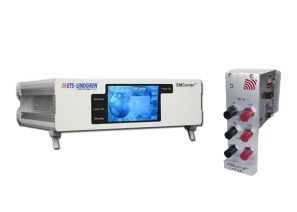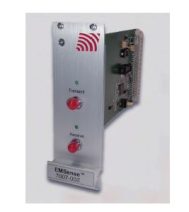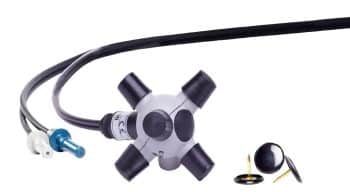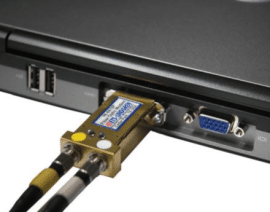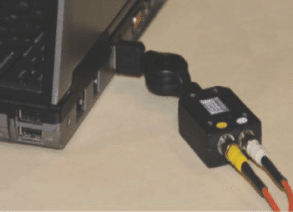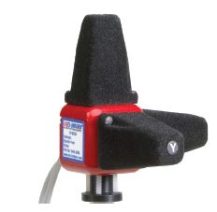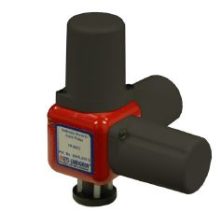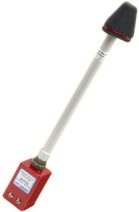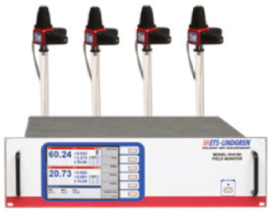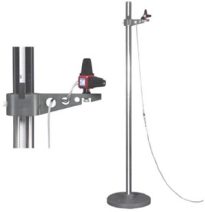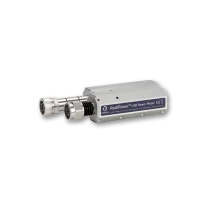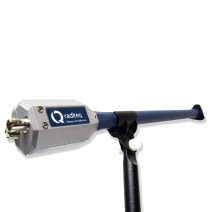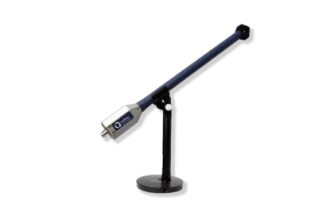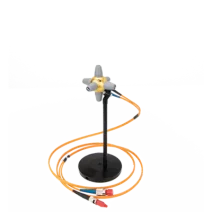Electromagnetic Compatibility (EMC) /
RF Field Probes
RF field probes are specialized measurement devices designed to detect and quantify the electromagnetic fields (EMF) generated by radio frequency (RF) sources. They are commonly used in a wide range of applications, including electromagnetic compatibility (EMC) testing, antenna design, and electromagnetic radiation monitoring.
RF field probes work by detecting the electric and magnetic fields in the vicinity of the RF source. The probe typically consists of a small antenna or coil, which is placed near the source of interest. The probe then measures the electric or magnetic field strength at that point, and the resulting data is recorded or displayed on a measuring device.
RF field probes come in different shapes and sizes, with different frequency ranges and sensitivities, depending on the specific application. Some probes are designed to measure very high-frequency fields, while others are intended for lower-frequency applications. In addition, some probes are highly directional, while others are omnidirectional.
One of the primary uses of RF field probes is in EMC testing, which is used to determine the degree to which a device or system can operate without interfering with other electronic equipment. RF field probes are used to measure the strength of the electromagnetic fields generated by the device being tested, as well as the fields generated by other nearby devices.
RF field probes are also used in antenna design, to measure the strength and directionality of the fields radiated by an antenna. This data is used to optimize the antenna design and ensure that it is radiating the desired signal in the intended direction.
RF field probes are specialized measurement devices designed to detect and quantify the electromagnetic fields (EMF) generated by radio frequency (RF) sources. They are commonly used in a wide range…
...of applications, including electromagnetic compatibility (EMC) testing, antenna design, and electromagnetic radiation monitoring.
RF field probes work by detecting the electric and magnetic fields in the vicinity of the RF source. The probe typically consists of a small antenna or coil, which is placed near the source of interest. The probe then measures the electric or magnetic field strength at that point, and the resulting data is recorded or displayed on a measuring device.
RF field probes come in different shapes and sizes, with different frequency ranges and sensitivities, depending on the specific application. Some probes are designed to measure very high-frequency fields, while others are intended for lower-frequency applications. In addition, some probes are highly directional, while others are omnidirectional.
One of the primary uses of RF field probes is in EMC testing, which is used to determine the degree to which a device or system can operate without interfering with other electronic equipment. RF field probes are used to measure the strength of the electromagnetic fields generated by the device being tested, as well as the fields generated by other nearby devices.
RF field probes are also used in antenna design, to measure the strength and directionality of the fields radiated by an antenna. This data is used to optimize the antenna design and ensure that it is radiating the desired signal in the intended direction.
-
ETS-LINDGREN’S EMCenter is a flexible platform consisting of an integrated micro-controller, modular chassis, and a selection of optional plug-in...FIND OUT MORE
-
ETS-Lindgren EMSense EMF Probe Plug-in Card provides an interface for ETS-Lindgren’s laser-powered E-field probes to the EMCenter Modular RF...FIND OUT MORE
-
Exceptionally small-sized spherical symmetrical configuration, lightweight and miniaturized electronics combined with excellent RF characteristics...FIND OUT MORE
-
The HI-4413P and ProbeView II” software provides extensive data gathering and display options for any fibre optically coupled Holaday probe. It...FIND OUT MORE
-
The HI-4413USB Fibre to USB Converter is an economical way to collect and display data from all of the ETS-Lindgren EMC optically coupled field...FIND OUT MORE
-
ETS-Lindgren’s Model HI-6005 Electric Field Probe has now been replaced by the HI-6006 which features a field-replaceable battery. Please...FIND OUT MORE
-
ETS-Lindgren’s Model HI-6006 Electric Field Probe is a fully intelligent sensor enabling fast and accurate EMF measurements with...FIND OUT MORE
-
ETS-Lindgren’s Model HI-6023 RF Field Probe is a fully intelligent sensor enabling fast and accurate EMF measurements with industry-leading...FIND OUT MORE
-
ETS-Lindgren’s HI-6053 Electric Field Probe provides broadband frequency coverage and wide dynamic range that satisfies the demands of most...FIND OUT MORE
-
The ETS-Lindgren Holaday EMF Model HI-6100 Field Monitor Readout Unit provides measurement display, control and alarm functions for up to four...FIND OUT MORE
-
The Model H-491269 Probe Stand is designed for accurate and repeatable probe positioning when performing field uniformity calibration in accordance...FIND OUT MORE
-
RadiPower® Power Meter | 80 MHz up to 18GHz An adequate power meter is indispensable to perform reproducible and reliable RF power measurements. The...FIND OUT MORE
-
RadiSense® 10 MHz – 26 GHz E-field probe RadiSense® RSS2026H RadiSense® 10 MHz – 26 GHz LASER powered field strength sensor Specifications...FIND OUT MORE
-
RadiSense® 26S | 10 MHz – 26 GHz E-field probe RadiSense® RSS2026S RadiSense® 10 MHz – 26 GHz LASER powered E-field probe Specifications...FIND OUT MORE
-
RadiSense® 40H | 10 MHz – 40 GHz E-field probe RadiSense® RSS2040H RadiSense® 10 MHz – 40 GHz LASER powered field strength sensor...FIND OUT MORE
-
RadiSense® 40S | 10 MHz – 40 GHz E-field probe RadiSense® RSS2040S – This probe specializes in achieving the highest accuracy. Specifications...FIND OUT MORE
-
RadiSense® 20 MHz – 10 GHz laser powered E-field probe RadiSense® RSS2010S RadiSense® 20 MHz – 10 GHz miniature spherical six antenna elements...FIND OUT MORE
-
RadiSense® 20 MHz – 10 GHz laser powered E-field probe RadiSense® RSS2010H RadiSense® 20 MHz – 10 GHz miniature spherical six antenna elements...FIND OUT MORE
-
RadiSense 9 kHz – 10 GHz laser powered E-field probe RadiSense® RSS2010I RadiSense® 10 MHz – 10 GHz miniature spherical six antenna element...FIND OUT MORE
-
RadiSense® 9 kHz – 10 GHz laser powered E-field probe RadiSense® RSS2010B RadiSense® 20 MHz – 10 GHz miniature spherical six antenna elements...FIND OUT MORE
-
RadiSense 10E LASER powered E-field probe set Specifications Frequency range: 20 MHz to 10 GHz Measuring range: 0.5 V/m to 200 V/m Frequency...FIND OUT MORE

